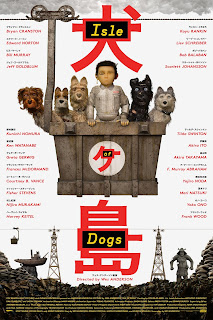Isle of Dogs (2018)
 There is something about Wes Anderson’s filmmaking that
ensnares me. I cannot say if it is his meticulous method, his whimsical and dry
humor, or his ability to tell parable-like stories about human nature; whatever
the case, his unique technique makes me love every single one of his films –
even the lesser ones are still highly enjoyable.
There is something about Wes Anderson’s filmmaking that
ensnares me. I cannot say if it is his meticulous method, his whimsical and dry
humor, or his ability to tell parable-like stories about human nature; whatever
the case, his unique technique makes me love every single one of his films –
even the lesser ones are still highly enjoyable.
Isle of Dogs is no
different in that respect; the film's style has the same overtly charming
effect on me as all of Anderson's other works. I reveled in the experience of
seeing one of his films in a theater for the first time. My question going into
the film was what Isle of Dogs would
do to make itself different from the other films in Anderson's catalog and
whether those differences would benefit or hinder the final product.
The biggest difference is the setting; Anderson has not set
any of his films in the Far East yet, the closest being The Darjeeling Limited in India. Placing the story in Japan with
many Japanese characters results in some interesting choices for the film
aesthetically, as it references Anderson's love of Japanese cinema by imitating
some of its style. He also decides to render all Japanese-speaking characters
with subtitles, translators, or without any translation into English at all.
This decision was hit-or-miss for me, but in retrospect it plays on the
fallibility of translation, which with the westernized portrayal of Japan – using
only the most obvious of cultural markers instead of a thorough and deep homage
to the culture – becomes a major theme of the whole film. It is almost like
Anderson wants the cultural and linguistic aspects of the film that a western
audience might not understand to become lost in the translation between East
and West. Such emphasis is subtle but present and deepens those choices the
film makes.
Another unique point to the rest of Anderson’s filmography
is the animation. While he has used stop-motion for an entire film before in
2009’s Fantastic Mr. Fox, the style here is markedly different. Fantastic
Mr. Fox had a less jarring feel to it, likely because of the emphasis on
warmer earth tones for its color palette. Isle of Dogs is much starker
and almost dull; it uses predominantly a parchment-like grey, red, black, and
yellow, painting a bleak picture of the film’s world. This is quite fair, as
the government of a Japanese city has banned all dogs to an existence on Trash
Island (which is exactly what it sounds like).
When looking at the film’s canine characters, all these
decisions makes a lot more sense. Anderson uses these animals to tell a story
about human nature in a way only he could while also making a sincere homage to
the special place dogs hold in humanity’s heart. There is little culpability on
their parts, and they all exhibit a warmth and tenderness, however hard their
exteriors might seem; in fact, they appear to mirror humanity more than the
human characters in the film due to the use of subtitles on nearly every human
character. One prominent example of the canines’ human-like side is early in
the film when two packs of dogs are fighting over a pile of garbage, and they
suddenly stop to make sure that they are fighting over something worthwhile; it
was a bit ridiculous in a way only Anderson can get away with. The voice acting
behind them ties incredibly well into the script, with each actor seemingly
having their lines written just for them; that becomes less surprising when
seeing that every one of the main pack we follow, save Bryan Cranston as their
leader, is an Anderson regular (Bill Murray, Jeff Goldblum, Edward Norton, and
Bob Balaban), but it is not any less enjoyable.
Whether or not you will like or love Isle of Dogs
will depend on your opinion of Wes Anderson as a filmmaker. If you find his
work too high-brow or pretentious, this will not change your mind one bit. On
the other hand, if like me you find the visuals as delectable as the best
Mendel’s pastry you can dream up and the writing as hilarious as any comedy
classic, then I cannot imagine how you could be disappointed. There are some
odd choices made, but for the most part Isle of Dogs is another
beautiful, warm-hearted, and charming addition to the filmography of one of the
most unique directors working today.
My recommendation: If you like Anderson, you will enjoy
this.
My grade: 91/100



Comments
Post a Comment